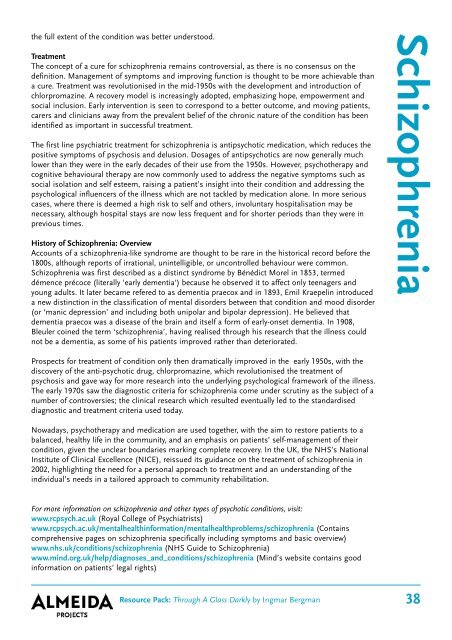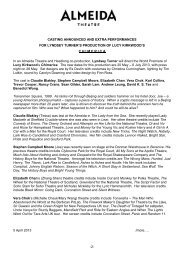Through a Glass Darkly - Almeida Theatre
Through a Glass Darkly - Almeida Theatre
Through a Glass Darkly - Almeida Theatre
- No tags were found...
Create successful ePaper yourself
Turn your PDF publications into a flip-book with our unique Google optimized e-Paper software.
the full extent of the condition was better understood.TreatmentThe concept of a cure for schizophrenia remains controversial, as there is no consensus on thedefinition. Management of symptoms and improving function is thought to be more achievable thana cure. Treatment was revolutionised in the mid-1950s with the development and introduction ofchlorpromazine. A recovery model is increasingly adopted, emphasizing hope, empowerment andsocial inclusion. Early intervention is seen to correspond to a better outcome, and moving patients,carers and clinicians away from the prevalent belief of the chronic nature of the condition has beenidentified as important in successful treatment.The first line psychiatric treatment for schizophrenia is antipsychotic medication, which reduces thepositive symptoms of psychosis and delusion. Dosages of antipsychotics are now generally muchlower than they were in the early decades of their use from the 1950s. However, psychotherapy andcognitive behavioural therapy are now commonly used to address the negative symptoms such associal isolation and self esteem, raising a patient’s insight into their condition and addressing thepsychological influencers of the illness which are not tackled by medication alone. In more seriouscases, where there is deemed a high risk to self and others, involuntary hospitalisation may benecessary, although hospital stays are now less frequent and for shorter periods than they were inprevious times.History of Schizophrenia: OverviewAccounts of a schizophrenia-like syndrome are thought to be rare in the historical record before the1800s, although reports of irrational, unintelligible, or uncontrolled behaviour were common.Schizophrenia was first described as a distinct syndrome by Bénédict Morel in 1853, termeddémence précoce (literally 'early dementia') because he observed it to affect only teenagers andyoung adults. It later became refered to as dementia praecox and in 1893, Emil Kraepelin introduceda new distinction in the classification of mental disorders between that condition and mood disorder(or ‘manic depression’ and including both unipolar and bipolar depression). He believed thatdementia praecox was a disease of the brain and itself a form of early-onset dementia. In 1908,Bleuler coined the term ‘schizophrenia’, having realised through his research that the illness couldnot be a dementia, as some of his patients improved rather than deteriorated.SchizophreniaProspects for treatment of condition only then dramatically improved in the early 1950s, with thediscovery of the anti-psychotic drug, chlorpromazine, which revolutionised the treatment ofpsychosis and gave way for more research into the underlying psychological framework of the illness.The early 1970s saw the diagnostic criteria for schizophrenia come under scrutiny as the subject of anumber of controversies; the clinical research which resulted eventually led to the standardiseddiagnostic and treatment criteria used today.Nowadays, psychotherapy and medication are used together, with the aim to restore patients to abalanced, healthy life in the community, and an emphasis on patients’ self-management of theircondition, given the unclear boundaries marking complete recovery. In the UK, the NHS’s NationalInstitute of Clinical Excellence (NICE), reissued its guidance on the treatment of schizophrenia in2002, highlighting the need for a personal approach to treatment and an understanding of theindividual’s needs in a tailored approach to community rehabilitation.For more information on schizophrenia and other types of psychotic conditions, visit:www.rcpsych.ac.uk (Royal College of Psychiatrists)www.rcpsych.ac.uk/mentalhealthinformation/mentalhealthproblems/schizophrenia (Containscomprehensive pages on schizophrenia specifically including symptoms and basic overview)www.nhs.uk/conditions/schizophrenia (NHS Guide to Schizophrenia)www.mind.org.uk/help/diagnoses_and_conditions/schizophrenia (Mind’s website contains goodinformation on patients’ legal rights)Resource Pack: <strong>Through</strong> A <strong>Glass</strong> <strong>Darkly</strong> by Ingmar Bergman 38
















